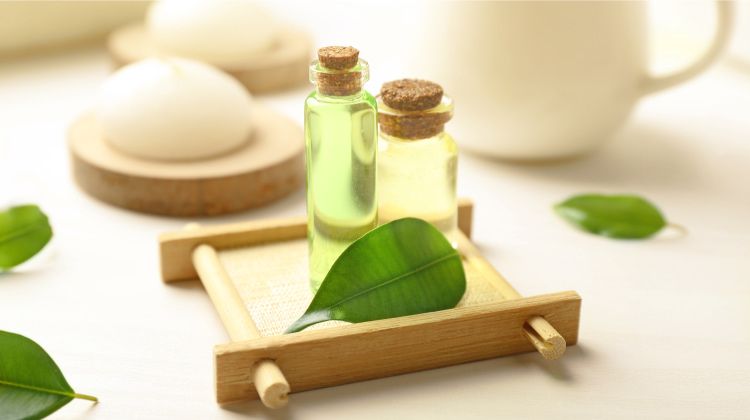
Welcome to the world of tea tree oil for hair! This magical oil offers a plethora of benefits that can help transform your locks into a luscious, healthy mane. Whether you're struggling with dandruff, hair loss, or an itchy scalp, tea tree oil might just be the answer to your hair woes.
In this article, we'll explore tea tree oil for scalp benefits, who should consider using it, and how to use it effectively. We'll also discuss all the different tea tree oil blends as well as the best tea tree oil hair products on the market right now. Prepare yourself for a deep dive into the tea tree oil experience and discover why it's creating a buzz in the hair care world!
What Is Tea Tree Oil?
So, what is tea tree oil, exactly? Tea tree oil, scientifically known as melaleuca alternifolia or Melaleuca oil, is a pure essential oil(1) extracted from the leaves and branches of the tea tree native to Australia. Its antimicrobial, antiseptic, and anti-inflammatory properties have made it a favorite in skincare and haircare products.
Historically, tea tree oil was used to treat wounds and has been studied for its potential in treating acne, fungal infections, and more. With all these amazing properties, it's no wonder tea tree oil is a go-to ingredient for promoting healthy, clean, and strong hair!
8 Benefits Of Tea Tree Oil for Hair
You might be wondering, what exactly can tea tree oil do for your hair? Well, let me tell you, tea tree oil is an amazing addition to your hair care routine, offering a plethora of benefits. It helps your hair grow, reduces dandruff, and even removes lice! But that’s not all, here’s a deeper look at tea tree oil:
Combat Dry Scalp
You know that uncomfortable feeling of a dry, itchy scalp? Tea tree oil will save you! Its soothing properties help relieve the discomfort caused by harsh chemicals found in some shampoos, like sulfates. By incorporating tea tree oil into your hair care routine, you can say goodbye to flakiness and hello to a well-hydrated, happy scalp. Plus, it can even replace your current conditioner, saving you time and money!
Fight Dandruff
No one likes seeing those pesky white flakes on their shoulders. Thankfully, you can use tea tree oil for hair dandruff(2) for your hair, thanks to its antifungal properties. It targets the yeast responsible for dandruff, reducing symptoms like flaking and itchiness. In fact, studies have shown that using tea tree oil for hair shampoo can lead to a 41% improvement in dandruff symptoms. How awesome is that?
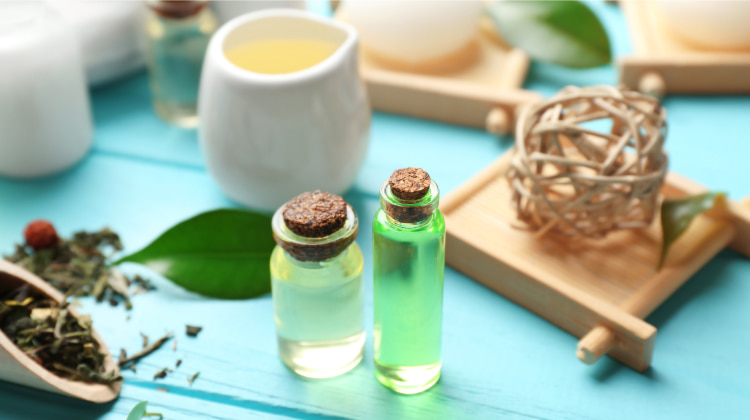
Reduce Inflammation
Inflammation on the scalp can lead to hair loss, which is definitely something we all want to avoid. Luckily, tea tree oil can help with that too! It reduces inflammation markers, which can potentially prevent hair loss caused by an inflamed scalp. And let's not forget about its antioxidant properties, which also contribute to its anti-inflammatory effects. Talk about a powerful combo!
Regulate Oil Production
Is oily hair your daily struggle? Tea tree oil can help by treating the source of overproduction and regulating your scalp's oil production. This leads to a healthier scalp and better-looking hair overall. Its effectiveness against yeast may also aid in reducing excessive oiliness, giving you the perfect balance you've been looking for!
Promote Hair Growth
While tea tree oil doesn't directly boost hair growth, it plays a crucial role in creating a healthy scalp environment. By clearing blocked hair follicles, removing product buildup, and fighting bacteria, tea tree oil indirectly contributes to new hair growth and prevents weak hair growth. So, if you're aiming for luscious locks, tea tree oil is your new BFF!
Reverse Hair Fall
Experiencing hair fall and thinning can be disheartening, but worry not! Tea tree oil nourishes hair roots, strengthens hair bonds, and most importantly, you can use tea tree oil for hair regrowth. With regular use and scalp massages, you'll notice a significant decrease in hair fall and thinning, resulting in a major hair transformation. Get ready to flaunt those gorgeous tresses!
Kill Hair Lice
The mere thought of head lice can make your skin crawl, right? Fortunately, tea tree oil's insecticidal properties(3) provide an effective, all-natural treatment for those pesky critters. Its holistic approach offers a gentle alternative to harsh chemical treatments, keeping both your scalp and hair healthy. Yes, that’s right, you can use tea tree oil for hair lice too.
Improves Overall Scalp Health
A healthy scalp is believed by most to be a prerequisite for strong, beautiful hair. The antiseptic and antimicrobial properties of tea tree oil(4) help maintain a clean, healthy scalp and support strong hair follicles. Plus, you can use tea tree oil for flaky scalp or other itchy scalp conditions, like seborrheic dermatitis.
Who Should Use Tea Tree Oil?
So, who should use tea tree oil? In short, tea tree oil is good for many people, especially those facing hair challenges like dandruff or scalp inflammation. We can also tea tree oil for hair loss. It's a versatile solution for promoting healthier hair growth and maintaining overall hair health, thanks to its antibacterial properties(5).
Tea tree oil can be used on all hair types and textures, but it's essential to dilute it before applying it to your skin. Using it undiluted may cause irritation, flaking, and dryness, especially If you have sensitive skin.
Tea tree oil also has the potential to cause contact or irritant dermatitis and allergic reactions. People with allergies to Balsam of Peru, benzoin, colophony tinctures, eucalyptol, or plants from the myrtle family should be extra careful.
How to Use Tea Tree Oil for Hair Growth
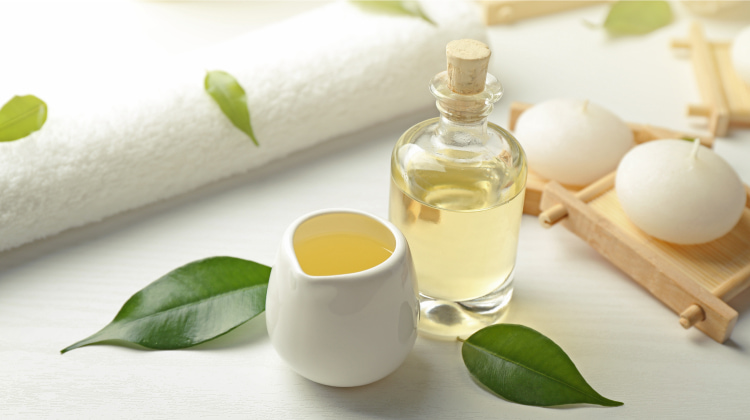
Tea tree oil and hair growth is already an iconic duo. It can be used in various ways, including as a pure essential oil, an active ingredient in shampoos, or mixed with carrier oils and other natural ingredients. Here are some methods to use tea tree oil specifically for hair growth:
Add Tea Tree Oil to Your Shampoo
Mix 10-15 drops of tea tree oil with every ounce of shampoo.
Massage the mixture from your hair into your scalp.
Let it sit for 3-5 minutes then commence rinsing thoroughly.
This helps cleanse hair follicles and nourish the roots, promoting hair growth.
Tea Tree Massage Oil for Your Scalp
Mix two to three drops of tea tree oil with your favorite carrier oil, such as almond, coconut, or jojoba oil, to prevent irritation.
Massage the mixture into your damp scalp post-shampoo, using your fingertips.
Massaging increases blood flow, which can benefit hair growth.
Tea Tree Oil in Your Favorite Hair Mask
Add a few drops of tea tree oil to your preferred deep conditioning treatment for added benefits.
Put the mixture on your hair, focusing on the roots and scalp.
This can help nourish hair follicles and promote healthy hair growth.
Use Products with Tea Tree Oil
To ensure the correct concentration and avoid potential irritation, consider using products that already contain tea tree oil. Look for shampoos, conditioners, and hot tea tree oil hair treatments specifically formulated for hair growth that contain tea tree oil as an active ingredient.
Tea Tree Oil Blends for Hair Growth
These blends combine tea tree oil with other essential oils and natural ingredients, creating a powerful hair growth potion.
Tea Tree Oil and Lavender Oil

Lavender oil(6), known for its soothing properties, can work wonders when combined with tea tree oil.
Ingredients:
- 5 drops of tea tree oil.
- 5 drops of lavender oil.
- 2 tablespoons of your preferred carrier oil (such as coconut or almond oil).
Instructions:
- Combine the tea tree oil, lavender oil, and carrier oil in a small bowl.
- Apply the blend to your scalp, massaging it in for a few minutes.
- Let the mixture stay on your scalp for at least 30 minutes.
- Wash your hair as usual.
Tea Tree Oil and Rosemary Oil
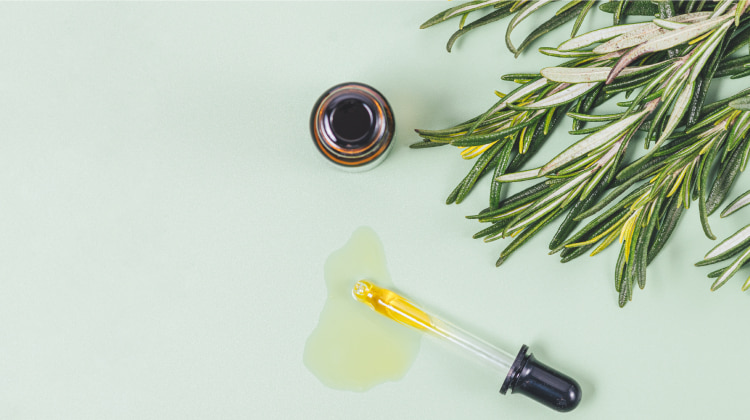
Rosemary oil(7) is known for stimulating hair growth and improving scalp circulation.
Ingredients:
- 5 drops of tea tree oil.
- 5 drops of rosemary oil.
- 2 tablespoons of carrier oil.
Instructions:
- Mix tea tree oil, rosemary oil, and carrier oil in a small bowl.
- Massage the result into your scalp.
- Leave the blend on your scalp for about 30 minutes.
- Use your most gentle shampoo to wash your hair.
Tea Tree Oil and Peppermint Oil
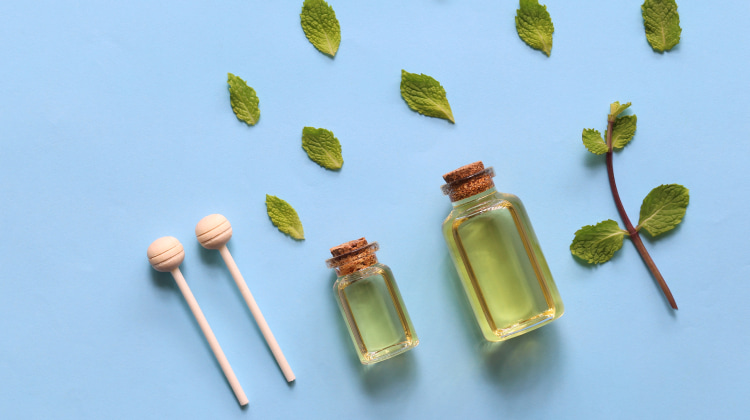
Peppermint oil(8) can invigorate your scalp, promoting hair growth.
Ingredients:
- 5 drops of tea tree oil.
- 5 drops of peppermint oil.
- 2 tablespoons of carrier oil.
Instructions:
- Combine tea tree oil, peppermint oil, and carrier oil in a small bowl.
- Massage the result into your scalp.
- Let the mixture stay on your scalp for 30 minutes.
- Wash your hair as usual.
Tea Tree Oil and Castor Oil
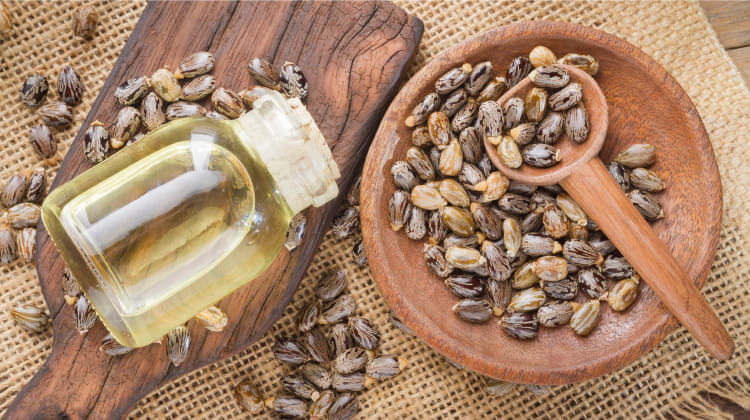
Castor oil(9) is known for its hair growth-promoting properties.
Ingredients:
- 1 teaspoon of tea tree oil.
- 1 teaspoon of castor oil.
Instructions:
- Mix equal parts of tea tree oil and castor oil in a small bowl.
- Massage the result into your scalp.
- Let it sit for 30 minutes.
- Wash your hair as usual.
Tea Tree Oil and Clary Sage Oil
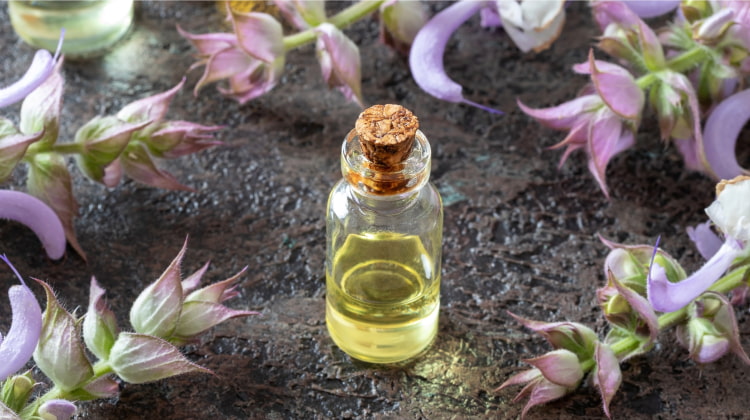
Clary sage oil(10) is known for balancing scalp oils and promoting hair growth.
Ingredients:
- 5 drops of tea tree oil.
- 5 drops of clary sage oil.
- 2 tablespoons of carrier oil.
Instructions:
- Combine tea tree oil, clary sage oil, and carrier oil in a small bowl.
- Apply the blend to your scalp, massaging it in for a few minutes.
- Let the mixture stay on your scalp for 30 minutes.
- Wash your hair as usual.
How Often Should You Use Tea Tree Oil In Hair?
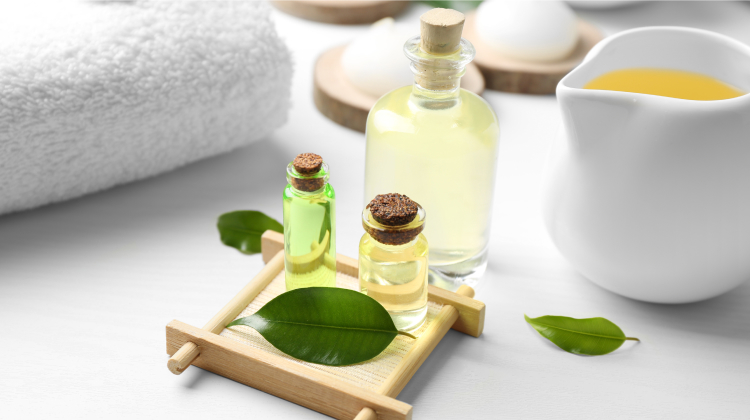
Wondering how many times should you use tea tree oil in your hair? Well, it all depends on your specific needs and the product you're using. To give you an idea, let's break it down based on different goals and treatments:
Combatting Scalp Irritation or Dryness
If you're dealing with a dry or irritated scalp, feel free to apply tea tree oil daily on damp hair. Just be cautious and make sure to dilute it first with carrier oil. That way, you won't accidentally cause further irritation by using pure essential oil.
Tackling Dandruff
Got dandruff? No problem! Simply incorporate tea tree oil into your hair care routine on a weekly basis. Adding a few drops to your regular shampoo or opting for a tea tree oil-infused shampoo should do the trick.
Opting for a Leave-In Treatment
Planning to use tea tree oil as a leave-in treatment? Mix it with carrier oil and apply it to your scalp no more than three times a week. This way, you can enjoy the benefits without overdoing it and risking irritation.
Using Tea Tree Oil-Infused Shampoos and Conditioners
You can use these products daily or follow your regular washing schedule. Just keep an eye on your scalp to make sure it doesn't get irritated.
Treating Specific Scalp Conditions
If you're using tea tree oil for hair bumps or folliculitis on scalp, applying a mixture of tea tree oil and another essential oil 2-3 times a week should suffice.
7 Best Tea Tree Oil Products for Hair Growth
Best for Refreshing Scalp - Paul Mitchell Tea Tree Special Shampoo
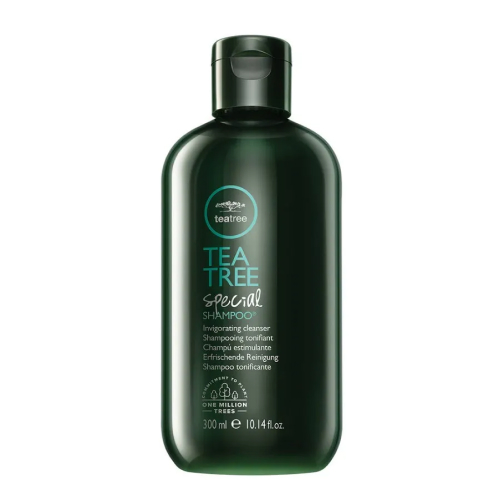
| Pros
|
Cons
|
Paul Mitchell Tea Tree Special Shampoo is a standout choice for revitalizing your scalp. It's loaded with a unique blend of tea tree oil, peppermint(8), and lavender(6), which creates an invigorating aroma and a tingling sensation on your scalp. This blend not only wakes up your senses but also helps wash away impurities, leaving your hair fresh and vibrant.
One notable feature is the Tingle Complex, which has many fans praising the "wake-up call" feeling it provides. But don't worry, it's suitable for all hair types, so anyone can enjoy this refreshing experience. Definitely try this tea tree oil shampoo for oily hair.
On top of that, this shampoo is eco-friendly, color-safe, vegan, and paraben-free. However, if you have an infected or sensitive scalp, do consult a dermatologist before using it. In summary, the Paul Mitchell Tea Tree Special Shampoo offers a refreshing and invigorating experience for your scalp while keeping your hair clean and full of life. It's definitely worth trying!
Best for Deep-Cleansing - OGX Hydrating + Tea Tree Mint Shampoo
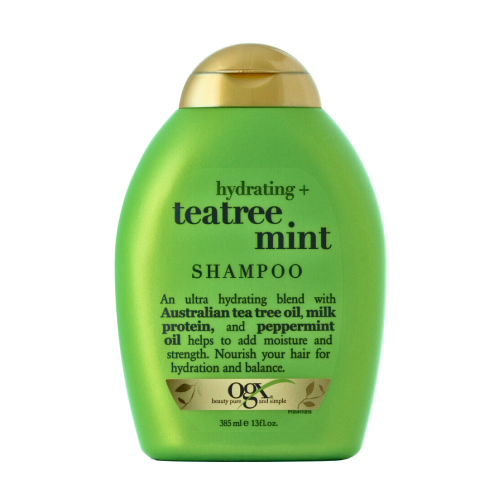
| Pros
|
Cons
|
Ready for a deep-cleansing experience with a refreshing twist? OGX Hydrating + Tea Tree Mint Shampoo is our pick for the best deep-cleansing option. This hydrating formula helps nourish and balance hair while leaving your locks feeling moisturized and soft. And who doesn't love the irresistible blend of sweet peppermint, iced vanilla, and tea tree scents?
But it's not just about the fragrance; this shampoo is packed with Australian tea tree oil to invigorate the scalp(4) and promote a healthy look and feel. It's also enriched with milk protein to smooth and strengthen hair, plus peppermint oil for that refreshing tingle. You'll get a thorough clean and enjoy a sensory experience every time you lather up.
Worried about harsh chemicals? This OGX shampoo is paraben-free with sulfate-free surfactants, keeping it simple and pure. Just apply generously to wet hair, massage into a lather, rinse, and follow with your favorite conditioner. The result? Balanced and hydrated hair that smells absolutely divine.
Best For Seborrheic Dermatitis - Maple Holistics Tea Tree Shampoo
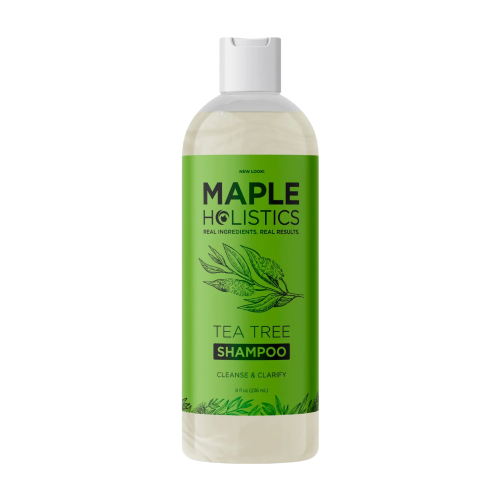
| Pros
|
Cons
|
Maple Holistics Tea Tree Shampoo is a top pick for those battling seborrheic dermatitis. It clarifies your scalp and removes buildup, using a blend of real ingredients like tea tree oil, rosemary, lavender, and argan oil. This gentle yet effective shampoo is paraben-free and sulfate-free, perfect for all hair types, including color-treated locks.
The shampoo contains keratin and botanical extracts like jojoba oil for extra hydration(11). Maple Holistics Tea Tree Shampoo offers a balanced approach to hair care, making it an effective tea tree oil for greasy hair. Plus, it's vegan and safe for color-treated hair, so you can enjoy its benefits without any worries.
To use, massage a quarter-sized amount into wet hair, working from the scalp to the tips. Rinse and follow up with Maple Holistics Tea Tree Conditioner for the best results. And the scent? Refreshing without being too medicinal or flowery, thanks to the tea tree and lavender.
With a 100% no-risk money-back guarantee, you can give your hair the TLC it deserves with confidence. So, why not treat your hair to a tea tree-infused cleanse?
Best Tea Tree Oil - Handcraft Tea Tree Essential Oil
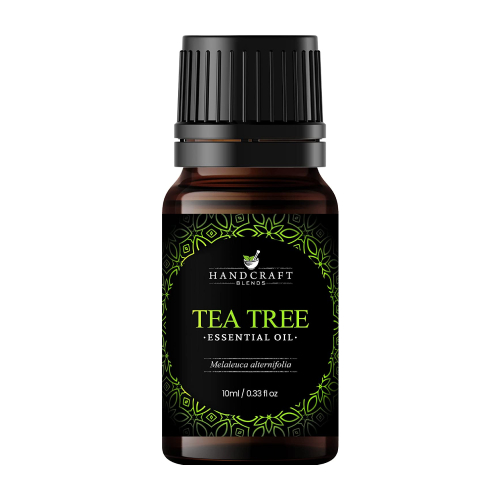
| Pros
|
Cons
|
If you're in search of a truly pure and natural tea tree essential oil for hair, look no further than Handcraft Tea Tree Essential Oil. It's the real deal, as the oils are tested by an independent lab to ensure they're free from fillers, additives, and dilution.
Handcraft Blends takes pride in offering premium therapeutic-grade essential oils. Each batch undergoes rigorous testing to check for purity and efficacy. Plus, they bottle their oils in amber glass to protect them from sunlight. Talk about quality assurance!
One fantastic aspect of this tea tree oil is its versatility! It blends beautifully with a variety of other oils like Bergamot(12), Cedarwood(13), and Lemon(14), to name a few. And with a built-in dropper, you can easily control the flow and get the exact amount you need.
It's reassuring to know that Handcraft Blends sources their oils from top-notch regions worldwide, and they bottle them right here in the USA. Moreover, they care about sustainability, offering recyclable shipping boxes and secure payments. If you're looking for a top-tier tea tree oil, this one's definitely worth considering!
Best Natural - Love Beauty & Planet Sulfate Free Vetiver & Tea Tree Oil Shampoo
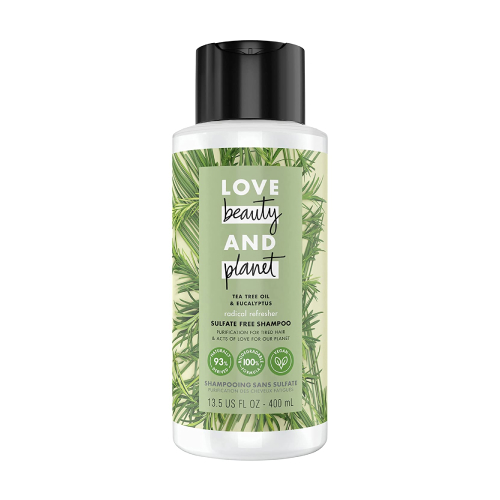
| Pros
|
Cons
|
Imagine a shampoo that not only detoxes and volumizes your hair but also keeps you feeling guilt-free about your beauty choices. Love Beauty & Planet's Sulfate-Free Vetiver & Tea Tree Oil Shampoo is a brilliant option for those looking to purify their hair and make a positive impact on the environment. Infused with Australian tea tree oil and vetiver(15), this shampoo gently cleanses your hair, removing impurities that can weigh it down.
Who doesn't love a good hair day with an energizing scent? The vetiver fragrance adds a refreshing blend of citrus notes and precious woods, making each shower a revitalizing experience. Plus, it's 93% naturally derived and free from sulfates, parabens, silicones, dyes, and phthalates.
Ethical choices matter, and this shampoo ticks all the boxes: cruelty-free, vegan, and made from 100% recycled bottles. It's even safe for colored hair! Tea tree oil, sourced from the wet lowlands of Australia, is known for its purifying properties and meets the brand's high standards.
To use this shampoo, simply massage it into wet hair, lather, and rinse thoroughly. Follow up with the Radical Refresher Conditioner for the best results. Give your hair a natural, refreshing detox with this fantastic, eco-friendly option.
Best Tea Tree Shampoo Bar - Kitsch Tea Tree + Mint Clarifying Shampoo Bar
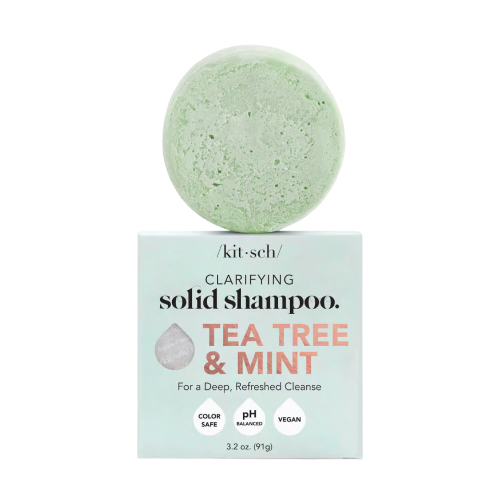
| Pros
|
Cons
|
Introducing the Kitsch Tea Tree + Mint Clarifying Shampoo Bar, the eco-friendly shampoo option that's all about a healthy scalp and luscious locks. This shampoo bar provides a deep, effective cleanse thanks to its tea tree essential oil formulation(4). It's also perfect to use this tea tree oil for dry hair. Plus, it helps remove excess oil and buildup, making it perfect for keeping those pesky flakes at bay.
But wait, there's more! This little gem is free of parabens, phthalates, silicones, sulfates, and artificial fragrances. It's like a breath of fresh air for your hair, with a lovely tea tree and eucalyptus scent. And did I mention it helps reduce single-use plastic waste? That's right, this bar saves you from using two bottles of liquid shampoo or conditioner. Talk about a win-win!
Using the shampoo bar is super simple: wet your hair, lather the bar in your hands or apply it directly to your scalp, massage, and rinse. If you're looking for a shampoo that supports hair growth, clarifies, and soothes an itchy scalp, this shampoo bar has you covered.
Best Organic Oil - Public Goods Tea Tree Essential Oil
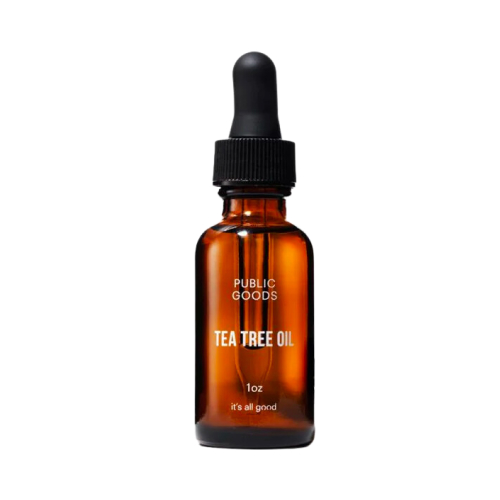
| Pros
|
Cons
|
Public Goods Tea Tree Essential Oil is a 100% pure, non-GMO, organic tea tree oil for hair for those who are passionate about using high-quality, natural products in their hair care routine. You know that feeling when you discover a versatile gem? This oil is exactly that! Its powerful antiseptic properties(4) make it a fantastic alternative to conventional hair products.
With this oil, you can easily whip up your own shampoo, face wash, or even massage oil. And guess what? It's also popular for creating DIY household cleaners. So, it's not only good for your hair but also for keeping your home fresh and clean!
The best part? This product is single-origin, vegan-friendly, and organic. Public Goods goes the extra mile by ensuring there's absolutely nothing to hide in their ingredients, making it a perfect choice for those who truly value transparency. So, if you're looking for an organic tea tree oil that offers a wide range of uses and benefits, Public Goods Tea Tree Essential Oil is definitely worth considering.
How to Choose The Best Tea Tree Oil Products for Hair
Selecting the right tea tree oil product for your hair can make a world of difference in addressing your specific concerns. But with so many options out there, how do you choose the best one?
Let me share with you our foolproof guide on how to select the perfect tea tree oil product for your hair! These criteria that we used to make these tea tree oil for hair reviews above ensure that you get the most effective and suitable product for your hair concerns:
Tea Tree Oil Concentration
You want the star of the show to make a real impact, right? Look for products with tea tree oil high up on the ingredient list, ensuring its effectiveness in addressing your hair concerns.
Ingredients
All-natural tea tree oil products are your best bet. They smell better and provide more health benefits, minus the nasties like GMOs and parabens. Just remember to dilute pure tea tree oil for hair before use to avoid scalp irritation.
Gentle is the name of the game when it comes to hair care. Opt for sulfate-free shampoos that cleanse without irritating your scalp.
Your Hair
We all have unique hair, so choose a product that suits yours. Keep an eye out for words like volumizing, strengthening, or balancing on labels. They indicate products that remove excess oil while retaining moisture, striking that perfect balance.
Formulation
Tea tree oil and menthol make a dream team for dry scalps. This combo harnesses the antiseptic and antibacterial properties(4) of tea tree oil to fight dandruff-causing fungus and soothe itching.
Form
Tea tree oil comes in various forms, such as shampoos, soaps, and more. For skin issues, go for mixtures that reduce the risk of irritation. Steer clear by applying pure oil directly on your skin.
Risks & Warnings
Keep in mind these precautions to ensure you're using tea tree oil safely:
Topical Use Only
Only use tea tree oil externally. Ingesting it can lead to severe side effects, such as loss of muscle control, unsteadiness, confusion, and even coma. For those living with children, keep it out of their reach.
Skin Irritation
Tea tree oil can cause skin irritation, especially in those with sensitive skin, eczema, or rosacea. To avoid adverse reactions, perform a patch test by applying a small amount of diluted tea tree oil on your inner arm and waiting 24 to 72 hours to check for any issues. If you experience burning, rash, or redness, steer clear of the product.
Allergic Reactions
Fresh tea tree oil is less likely to cause allergies compared to oxidized tea tree oil. However, if you're allergic to Balsam of Peru, benzoin, colophony tinctures, eucalyptol, or plants from the Myrtaceae family (e.g., clove, allspice, guava, and myrtle), it's best to avoid tea tree oil.
Side Effects
Some side effects of tea tree oil include depression, diarrhea, drowsiness, fatigue, muscle tremors, itching, rashes, skin irritation, swelling, dry or scaly skin, burning, and stinging. Pregnant and breastfeeding women should consult their doctor before using tea tree oil.
Proper Dilution
Always dilute tea tree oil for topical use on hair by mixing it with a carrier oil, particularly for those with sensitive skin or when applying it to a child's skin. How to dilute tea tree oil for hair? Add 12 drops of carrier oil to every 1 or 2 drops of tea tree oil. And don’t think of using tea tree oil for scalp eczema, it's best to avoid doing so as it could worsen the condition.
Asthma Caution
If you have asthma, be careful when inhaling tea tree oil, as it might aggravate your symptoms.
To minimize the risk of side effects, follow these essential oil safety guidelines:
- Keep tea tree oil out of children's reach.
- Dilute it properly for topical use.
- Perform patch tests.
- Ensure proper ventilation for aromatherapy.
- Store the oil in a dark bottle away from light.
If you have any concerns or questions about using tea tree oil, consult your doctor, especially if you're pregnant, breastfeeding, taking prescription medications, or have an underlying health condition. By being cautious and informed, you can safely enjoy tea tree oil’s benefits for your hair and scalp.
Final Thought
And that’s all, folks! You're now equipped with the knowledge to harness the power of tea tree oil for hair growth and overall hair health. As you embark on this journey, never forget to follow the guidelines, perform patch tests, and consult your doctor when in doubt.
But most importantly, have fun experimenting with different blends and products to discover what works best for you and your hair. Who knows? You might just find the perfect formula that will make your locks flourish like never before. Go ahead, give tea tree oil a try, and may your hair journey be filled with excitement, luscious locks, and tons of compliments!
Frequently Asked Questions
What does tea tree oil do for hair?
Tea tree oil promotes hair growth, fights dandruff, soothes dry scalp, and controls excess oil, thanks to its antimicrobial and anti-inflammatory properties.
Does tea tree oil help with dandruff?
Yes, tea tree oil helps with dandruff due to its antibacterial properties, which can reduce flakes and soothe the scalp.
Does tea tree oil help with hair growth?
Yes, tea tree oil can help with hair growth by unclogging hair follicles and nourishing the scalp, creating a healthy environment for hair growth.
Does tea tree oil help with dry scalp?
Yes, tea tree oil can help soothe dry scalp with its anti-inflammatory and moisturizing properties.
Is tea tree oil good for hair loss?
Tea tree oil can indirectly help with hair loss by promoting a healthy scalp, which is essential for healthy hair growth.
Is tea tree oil good for OILY hair?
Yes, it's great to use tea tree oil for oily hair as it can help control excess oil production while maintaining a healthy scalp.
Can I apply tea tree oil directly on hair?
No, it's not recommended to apply tea tree oil directly on hair. Dilute it with carrier oil or mix it with shampoo to avoid irritation.
Can I leave tea tree oil in my hair overnight?
Yes, you can leave tea tree oil in your hair overnight when diluted with a carrier oil like coconut, almond, or olive oil.
How long should I leave tea tree oil in my hair?
For best results, leave tea tree oil in your hair for at least 30-45 minutes or overnight if diluted with carrier oil.
Is tea tree oil bad for hair?
Tea tree oil is not bad for hair if used properly. However, if applied undiluted or used excessively, it may cause irritation.
References
1. Katarzyna Wińska, Mączka, W., Jacek Łyczko, Grabarczyk, M., Czubaszek, A. and Antoni Szumny (2019). Essential Oils as Antimicrobial Agents—Myth or Real Alternative? Molecules, {online} 24(11), pp.2130–2130. doi:https://doi.org/10.3390/molecules24112130.
2. Satchell, A.C., Saurajen, A., Bell, C.A. and Ross StC Barnetson (2002). Treatment of dandruff with 5% tea tree oil shampoo. Journal of The American Academy of Dermatology, {online} 47(6), pp.852–855. doi:https://doi.org/10.1067/mjd.2002.122734.
3. Emanuela Di Campli, Soraya Di Bartolomeo, Patricia Delli Pizzi, Nostro, A., Grande, R., Nostro, A. and Cellini, L. (2012). Activity of tea tree oil and nerolidol alone or in combination against Pediculus capitis (head lice) and its eggs. Parasitology Research, {online} 111(5), pp.1985–1992. doi:https://doi.org/10.1007/s00436-012-3045-0.
4. Carson, C.F., Hammer, K.A. and Riley, T.V. (2006). Melaleuca alternifolia (Tea Tree) Oil: a Review of Antimicrobial and Other Medicinal Properties. Clinical Microbiology Reviews, {online} 19(1), pp.50–62. doi:https://doi.org/10.1128/cmr.19.1.50-62.2006.
5. Lee, C.-J., Chen, L., Chen, L., Chang, T.-C., Chun Wei Huang, Huang, M. and Wang, C.C. (2013). Correlations of the components of tea tree oil with its antibacterial effects and skin irritation. Journal of Food and Drug Analysis, {online} 21(2), pp.169–176. doi:https://doi.org/10.1016/j.jfda.2013.05.007.
6. Cavanagh, H. and Wilkinson, J. (2005). Lavender essential oil: a review. Australian Infection Control, {online} 10(1), pp.35–37. doi:https://doi.org/10.1071/hi05035.
7. Bhaskaran Sasikumar (2012). Rosemary. Elsevier eBooks, {online} pp.452–468. doi:https://doi.org/10.1533/9780857095671.452.
8. Ji Seon Oh, Park, M.S. and Young Ho Kim (2014). Peppermint Oil Promotes Hair Growth without Toxic Signs. Toxicological research, {online} 30(4), pp.297–304. doi:https://doi.org/10.5487/tr.2014.30.4.297.
9. Ogunniyi, D.S. (2006). Castor oil: A vital industrial raw material. Bioresource Technology, {online} 97(9), pp.1086–1091. doi:https://doi.org/10.1016/j.biortech.2005.03.028.
10. Mohaddese Mahboubi (2020). Clary sage essential oil and its biological activities. Advances in traditional medicine, {online} 20(4), pp.517–528. doi:https://doi.org/10.1007/s13596-019-00420-x.
11. Luca Casettari, Roberts, A., Hamzi, S.H., Gad, H.A., Ilham Touiss, Altyar, A.E., Osama Adnan Kensara and Ashour, M.L. (2021). Jojoba Oil: An Updated Comprehensive Review on Chemistry, Pharmaceutical Uses, and Toxicity. Polymers, {online} 13(11), pp.1711–1711. doi:https://doi.org/10.3390/polym13111711.
12. Valussi, M., Davide Donelli, Vannacci, A. and Antonelli, M. (2021). Bergamot Oil: Botany, Production, Pharmacology. Encyclopedia, {online} 1(1), pp.152–176. doi:https://doi.org/10.3390/encyclopedia1010016.
13. Adams, R. (1991). Cedar Wood Oil — Analyses and Properties. Modern methods of plant analysis (1985), {online} pp.159–173. doi:https://doi.org/10.1007/978-3-642-84023-4_8.
14. Ali, B., Al-Wabel, N.A., Shams, S., Ahamad, A., Shah Alam Khan and Anwar, F. (2015). Essential oils used in aromatherapy: A systemic review. Asian pacific Journal of Tropical Biomedicine, {online} 5(8), pp.601–611. doi:https://doi.org/10.1016/j.apjtb.2015.05.007.
15. Lavania, U. (n.d.). Other Uses, and Utilization of Vetiver: Vetiver Oil. {online} Available at: https://naturalingredient.org/wp/wp-content/uploads/vetiver.pdf.

.jpg)
.jpg)
.jpg)
.jpg)
.jpg)
.jpg)
.jpg)
.jpg)
.jpg)
.jpg)